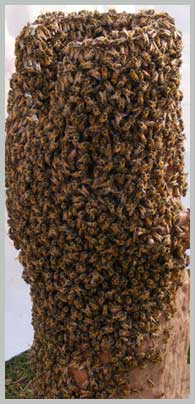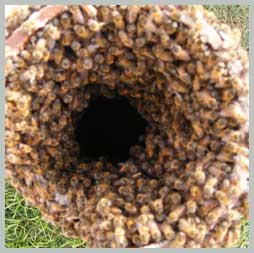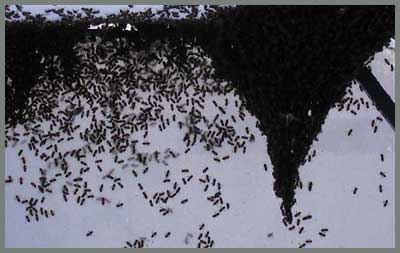Least expected placesLees gerus hierdie bladsy in Afrikaans Bees make their hives in unusual places Bees like to build their hives and make a home for the colony in quiet places where they can live and forage in peace, which is why they like hollow trees or cracks in rocks. But when they migrate into suburban areas these kinds of places become less available so the bees will make a home in anything that meets their needs. As bee removers we occasionally get called out to remove bees from odd often difficult to reach places.
In the instance above, the person had a birdbath in their garden, but the stand for the birdbath had a piece boken our of it at the top where it meets the actual bath. Bees found this to be the ideal place, cool, quiet, access to water and the chances of any interference would be almost non existant. However the owner noticed that fewer birds were coming for their bath and when she had a closer look she discovered the bees. Not wanting to harm the bees she was kind enough to let us take away the whole stand and move the bees into a hive without rushing or upsetting them. When we return the stand she will have to make sure the missing piece is replaced and any holes are sealed, in order to prevent another bee colony making a home in her birdbath.
Bees in a tent or marquee Weddings and camping it seems, are not only for humans. Bees like a
bit of a party now and again and if theres a wedding Timing for a wedding is important but you should really not try to remove the bees yourself because your guests are expected shortly. If you upset the bees you will have to attend to your guests who have been attacked by an angry swarm of bees, rather than just running a bit behind schedule because you've wisely decided to give us a call and have our professional bee removers take care of the situation. Camping might make it a bit difficult for us to get to you but our bee removers have found themselves dealing with bees in strange places more often than you think. If you are camping near town and find you have some uninvited guests in your tent, give us a call we love the outdoors and will gladly be of assistance. Rooftop Bees While on the subject of bees in odd places. Rooftop bees are on the
increase, but in this instance they are actually wanted. Although there are concerns that the bees may swarm and people could get stung, this is not likely as the hives are high up from where people are active outside and the beekeepers are sure to signpost the bee area and issue sufficient warning signs and posters. At this stage the only requirement by the health department is that any buckets of water for the bees are changed regularly in order avoid any kind of parasites or diseases which are usually borne in stagnant water. The bees forage for their nectar on any surrounding plantlife and whatever they may find on the sidewalks of the city. This is supplemented by a mixture of sugar and water supplied by the beekeeper. Aside from getting to spend some time outdoors on a regular basis the beekeeprs are learning, and benefitting from the honey their hives produce, some have even managed to turn their hobby into an extra income. What do bees do in winter? As the rest of nature goes into hibernation to survive bees return to the hive for winter. They will venture out on warmer days but for the duration of winter they will 'cluster'. Clustering takes place as the bees huddle around the queen in an attempt to keep her warm. The cluster is usually quite dense and the bees rotate their positions, affording themselves and each other a bit of the warmth they create. Warmth is generated by the bees shivering and creating a fricton-like heat. Energy to maintian the constant shivering is derived from the stores of honey within the hive as no foraging is done during this period. Should the food sources begin to dwindle, the bees will expel the drones from the hive. The drones are chosen to be expelled because they do not play any role in the daily survival of a bee colony other than to mate with the queen.
We are the best bee removal company
in South Africa!! |
|
| Buzz Bee Removals 083 652 0760 (branches throughout South Africa) 083 652 0760 |
|



 reception going to take place in a marquee they will be sure to get
there before anyone else.
reception going to take place in a marquee they will be sure to get
there before anyone else.  entirely
new phenomenon, beekeeping in the city was outlawed in 1999 by then
mayor, Rudi Giuliani and only legalised again in 2010.
entirely
new phenomenon, beekeeping in the city was outlawed in 1999 by then
mayor, Rudi Giuliani and only legalised again in 2010.